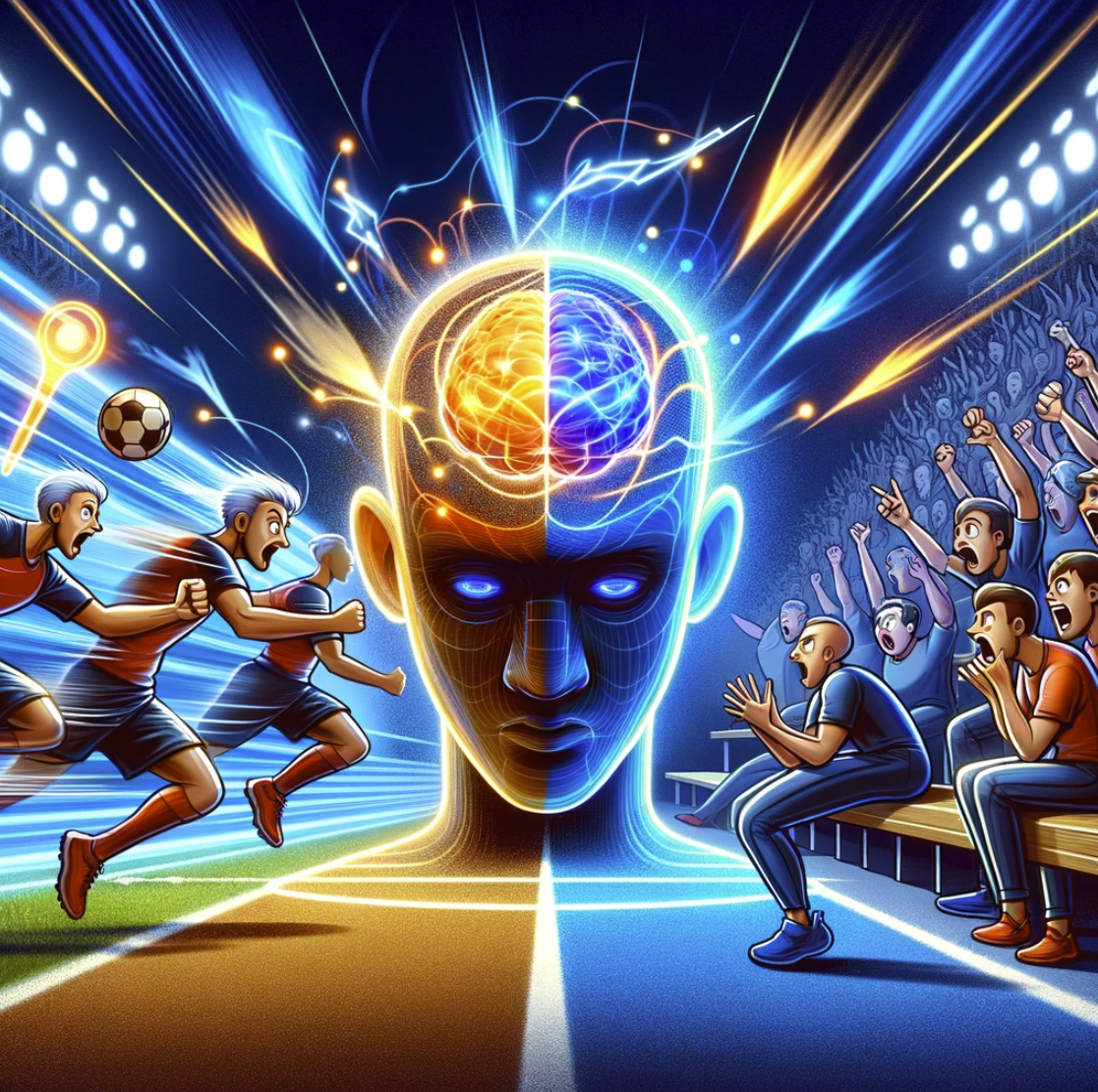Momentum in sports is often referred to as a shift in performance, energy, and confidence that can significantly affect the outcome of a game or match.
It’s a psychological phenomenon as much as it is physical, influencing both the players and the outcome in profound ways.
Key Points – Momentum in Sports
- Psychological Impact: Momentum significantly affects athletes’ confidence and performance, often turning the tide of competition.
- Strategic Creation: Teams can build momentum through successful plays, effective leadership, and exploiting opponents’ weaknesses.
- Counter Strategies: Opponents can disrupt momentum with strategic timeouts, tactical changes, and psychological resilience.
- Role of the Crowd: Enthusiastic crowd support can amplify a team’s momentum, influencing the game’s dynamics.
- Preparation and Adaptability: Effective preparation and mental conditioning help teams harness or counter momentum, emphasizing the importance of adaptability and resilience in competitive sports.
Why Does Momentum Occur?
Momentum occurs due to a combination of factors that can include successful plays, the influence of the crowd, psychological edge, and the physical state of the players.
When a team starts performing well, it boosts their confidence, and each successful play can build on the last, creating a sense of invincibility or inevitability among the team members.
This psychological boost can enhance performance, making players more aggressive, more coordinated, and more likely to take and succeed in risks.
How Do Teams Get It?
Successful Plays and Key Moments
Momentum often starts with a key play or a series of successful plays that elevate the team’s confidence and performance.
A critical goal, a significant defensive stop, or a successful play can be the spark.
Crowd Influence
The energy and noise from the crowd can significantly influence momentum by energizing the team and creating a daunting atmosphere for the opponents.
Leadership and Experience
Experienced players and strong leadership can help to stabilize a team’s performance and turn the tide in their favor, creating momentum.
Physical Fitness and Preparation
Teams that are better prepared and physically fit can maintain high levels of performance longer, helping to build and sustain momentum.
How Do Opposing Coaches Stop It?
Time-Outs and Breaks in Play
Using time-outs strategically can halt the game’s flow, allowing players to regroup and disrupt the opposing team’s rhythm.
Tactical Adjustments
Changing strategies, such as defensive formations or offensive tactics, can counteract the opponent’s successful plays, helping to shift momentum.
Psychological Tactics
Encouraging calmness, resilience, and focus among players to withstand pressure and reduce the psychological impact of the opponent’s momentum.
Key Players and Playmakers
Utilizing key players or playmakers to make significant plays can shift momentum back in favor of the opposing team.
An NHL team, for example, might pull/replace their goalie who is performing sub-optimally.
Strategy and Tactics of Momentum
Momentum in sports requires both strategic preparation and tactical flexibility.
Teams aim to build their own momentum while being prepared to counteract their opponents’ momentum through various means:
- Pre-game Preparation: Teams can prepare mentally and physically for the game, anticipating moments where momentum could shift and planning responses accordingly.
- In-game Management: Coaches and players must recognize when momentum is shifting and respond with strategic plays, psychological resilience, and tactical adjustments.
- Energy and Confidence: Building and maintaining high levels of energy and confidence are crucial for creating and sustaining momentum. Teams often use motivational techniques, focus on positive communication, and rely on leadership to keep morale high.
Salient Factors Involving Momentum in Sports
- Psychological Impact: Momentum has a profound psychological impact on both teams, affecting confidence, aggression, and decision-making.
- Physical Dominance: Teams with physical dominance can impose their game on the opponent, leading to momentum shifts.
- Game Context: The context of the game, such as the scoreline, the importance of the match, and external pressures, can influence how momentum develops and shifts.
- Crowd Influence: The home crowd can play a significant role in building momentum, offering an emotional boost to the home team and adding pressure to the opponents.
Q&A – Momentum in Sports
What exactly is momentum in sports?
Momentum in sports refers to a perceived shift in the game’s flow, often leading to one team gaining a psychological and performance edge over their opponent.
It’s characterized by a series of successful plays or events that boost a team’s confidence, potentially leading to improved performance and an increased likelihood of winning.
How can a team create momentum during a game?
A team can create momentum through a variety of ways, including scoring, effective defense, inspirational plays, or exploiting the opponent’s mistakes.
Consistent performance, strategic plays, and leveraging key players’ skills are critical. Leadership on the field or court, both from coaches and players, also plays a vital role in building momentum.
What are the signs that a team has gained momentum?
Signs of gained momentum include increased energy and confidence among players, more aggressive and coordinated play, and a noticeable shift in the game’s pace in favor of the team with momentum. The crowd’s reaction, such as increased noise and enthusiasm, can also indicate a momentum shift.
How does momentum affect individual players and the team as a whole?
For individual players, momentum can boost confidence, reduce anxiety, and improve focus, leading to better performance.
For the team as a whole, momentum can enhance cohesion, energy levels, and aggressiveness, making the team more formidable and likely to succeed in their strategies.
Can momentum be measured or quantified in sports?
Quantifying momentum in sports is challenging due to its subjective and psychological nature.
However, researchers attempt to measure it by analyzing patterns in scoring, performance metrics during key moments, and shifts in game dynamics. Despite these efforts, momentum largely remains a qualitative assessment.
How do opposing teams and coaches attempt to stop or reverse momentum?
Opposing teams and coaches use strategic timeouts, make tactical adjustments, and employ psychological strategies to disrupt the flow of the game and counter the opponent’s momentum.
This can involve changing the lineup, altering the game plan, or using key players to shift the dynamic in their favor.
What role does the crowd play in influencing momentum in sports?
The crowd can significantly influence momentum by providing emotional support to the home team, creating a challenging environment for the opposing team, and reacting vocally to the game’s events.
A supportive crowd can energize players, boost confidence, and contribute to the team’s momentum.
Are there psychological strategies to maintain or regain momentum?
Psychological strategies include maintaining focus, managing emotions, and using visualization techniques to envision successful outcomes.
Coaches and sports psychologists work with athletes to develop resilience, confidence, and a positive mindset, which are crucial for maintaining or regaining momentum during competition.
How important is momentum compared to skill and strategy in determining the outcome of a game?
While skill and strategy are fundamental to winning, momentum can be a critical factor that amplifies a team’s performance and can tip the balance in closely matched contests.
However, without the underlying skill and strategic execution, momentum alone is unlikely to determine the game’s outcome.
Does momentum have a greater impact in some sports compared to others?
Momentum can have a variable impact across different sports. It tends to have a more significant effect in high-scoring, fast-paced games like basketball or football, where shifts in energy and performance can quickly alter the game’s direction. In contrast, sports with individual performances or slower pacing may see a less pronounced impact of momentum.
How do teams practice and prepare for moments of momentum shift?
Teams prepare for momentum shifts through scenario-based training, mental conditioning, and developing strategies for different game situations. Coaches emphasize resilience, adaptability, and mental toughness to help players respond positively to changes in momentum.
Can a team have too much momentum, and can it backfire?
Excessive momentum can lead to overconfidence, complacency, or underestimating the opponent, potentially backfiring. Teams might neglect defense, make careless mistakes, or deviate from the game plan, allowing the opposing team to capitalize and shift the momentum in their favor.
How do commentators and analysts identify and discuss momentum during broadcasts?
Commentators and analysts identify momentum shifts by observing changes in the game’s pace, player energy levels, crowd reactions, and the success of strategic plays. They discuss momentum by highlighting these observations, providing insights into its potential impact on the game’s outcome.
What historical examples are there of momentum dramatically changing the outcome of a sports event?
Historical examples include remarkable comebacks or sudden declines in performance during crucial moments, such as the New England Patriots’ comeback in Super Bowl LI or the Boston Red Sox reversing the curse in the 2004 ALCS. These events showcase how momentum shifts can lead to unexpected outcomes in sports.
How do advances in sports psychology address the concept of momentum?
Advances in sports psychology address momentum through research on its effects, development of strategies to harness positive momentum, and techniques to counter negative shifts. This includes focusing on mental preparation, resilience training, and team dynamics to better understand and utilize momentum in competition.
Conclusion
Momentum in sports is a complex interplay of psychological, physical, and situational factors.
Recognizing and harnessing momentum can be the key to turning the tide in a game, while countering momentum requires strategic insight, psychological resilience, and tactical flexibility.


